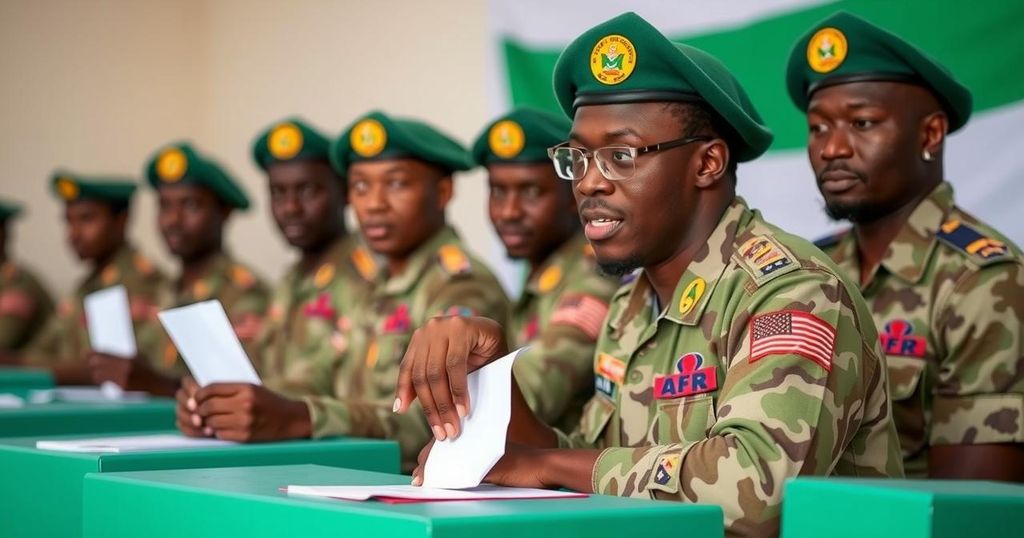Chad’s electoral commission has requested military protection due to rising violence against election officials and candidates as the December 29 elections approach. Opposition forces have protested against the ruling MPS party using force. The upcoming elections conclude a three-year transitional period following the death of former President Idriss Deby. Over 75 opposition groups criticize the elections as illegitimate and a facade for consolidating power by the current president.
Chad’s electoral commission, known as the National Election Management Agency (ANGE), has sought assistance from the military to ensure the safety of election officials and candidates as they approach the upcoming elections scheduled for December 29. This request comes in response to an increase in violent confrontations where opposition supporters have employed clubs and iron bars to obstruct the ruling Patriotic Salvation Movement (MPS) party’s campaign activities across various cities. Organizing elections in such a tumultuous environment raises concerns about potential armed conflicts should military support fail to materialize.
The situation reflects deep-seated tensions as this electoral process represents the conclusion of a three-year transitional phase that began following the demise of longtime President Idriss Deby Itno in April 2021. Approximately 8.3 million of Chad’s 18 million citizens have registered to vote, with nearly 1,300 candidates representing around 180 political parties competing for parliamentary seats and additional roles in local councils. Observers estimate that over 1,000 individuals will monitor the electoral process.
Nevertheless, a coalition of more than 75 opposition parties and civil society organizations has denounced the elections as a “masquerade.” They contend that President Mahamat Idriss Deby Itno and the MPS are manipulating the electoral framework to secure lasting control over Chad’s government. Increasingly violent protests have erupted in cities like Ndjamena, Bongor, Abeche, Lai, and Moundou, wherein opposition supporters have allegedly attacked MPS campaign convoys. Additionally, the military has intervened to dismantle roadblocks set by opposition factions where they sought to prevent MPS campaigners’ access to towns.
The president of Chad’s Party of Democrats, Avocksouma Djona, voiced his party’s position for postponing the elections, citing concerns over the legitimacy of the election management body, all of which he claims have been appointed by Deby. He further asserted that Deby’s influence extends to the constitutional court, creating conditions where favorable outcomes are anticipated for his party. Chinese-backed elections involving the appointment of officials to both the election management body and the constitutional court heighten concerns of electoral integrity.
While President Deby promised that the forthcoming elections would be fair and transparent, these assertions have been quickly dismissed by opposition groups, which argue that he is intent on orchestrating electoral fraud to maintain parliamentary control. Following the death of Idriss Deby Itno, Mahamat Idriss Deby ascended to the role of transitional president, pledging an initial eighteen-month transition plan which has since been extended by two years amidst widespread criticism. Furthermore, he won contested presidential elections in May 2021, during which numerous opposition parties opted to boycott the election.
The current political climate in Chad is characterized by instability stemming from the transition of power following the death of Idriss Deby Itno. The military and opposition factions are engaged in escalating unrest as the country prepares for its significant parliamentary and local elections. With Chad’s recent history of authoritarian rule and military influence in politics, the concerns regarding election integrity and the potential for violence are acutely prominent. The situation remains complicated by the widespread allegations from opposition parties accusing the ruling elite of manipulating electoral processes to entrench their authority further.
In conclusion, Chad’s upcoming elections are clouded by significant challenges, including security concerns, accusations of political manipulation, and growing tensions among various factions. As the electoral commission calls for military assistance amidst increasing violence, the integrity of the election process is under scrutiny from both domestic and international observers. The outcome of these elections could have profound implications for Chad’s return to civilian governance and democratic stability.
Original Source: www.voanews.com






